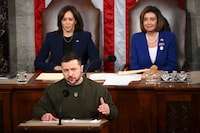In conversation recently with an eminent presidential biographer, I began a question by saying, “I don’t subscribe to the ‘great man theory’ of history.” He immediately replied, “Oh, I do,” and cited the compelling example of Abraham Lincoln, without whom the United States and the world would be different indeed.
Rising to a historic destiny, Zelensky embodies America’s values

Lincoln, in other words, was essential, tapped by fate for a specific test — yet the outcome of this assay was not predetermined. He could have wavered, flagged, fallen short.
This sense of destiny and chance as co-creators of a few outsize characters, of a savage lottery plucking a particular person at a particular moment to pass or fail a fiery trial — with decades and even centuries in the balance — loomed unmistakably over the stocky figure of Ukrainian President Volodymyr Zelensky during his day in Washington just before Christmas.
Perhaps that sounds too grand, too fraught. To speak in historic terms about daily events can feel frivolous, like admiring a child’s art project by saying it could hang in a museum. But all great figures start out smaller than they become. Lincoln in 1860, as he entered the forge with its licking flames, was an ungainly, uncouth, mocked and widely hated man. His attorney general, Edward Bates, confided to his diary: “He lacks will and purpose, and, I greatly fear, he has not the power to command.”
Follow David Von Drehle‘s opinions
FollowWe see Lincoln through a lens of eight score years. We recognize that he ought to have failed a dozen times or more, and that his failure would have gutted the principle of human rights. It would have elevated the slave driver and left enslaved people hopeless. The 20th century would have found no democracy strong enough to twice tip the bloody scales of war.
On a smaller stage, in a more star-crossed nation, Zelensky is, like Lincoln, an improbable protagonist in a vast and consequential drama. This former TV comedy star saved Ukrainian independence in February with a single decision. The Russians had invaded. Assassins were hunting for him. Escape was possible, but Zelensky would have had to leave immediately. A few months earlier, Afghanistan’s president faced the same choice, ran for his life, and the government fell within hours.
Zelensky stood fast. More than 300 days later, against all expectations, he and his nation are still standing.
This matters because the world cannot have peace unless Ukraine has peace. Historian Timothy Snyder has defined Ukraine and its Eastern European vicinity as the Bloodlands, the most violent frontier of the ghastliest era in human history. Its rich culture is macerated by violence, its past traumatized almost beyond belief. Zelensky is emblematic of this disputed territory: a native Russian speaker who is also a zealous patriot of Ukraine; a Jew nearly erased by the Holocaust; a grandson of farmers deliberately starved by Soviet communists. And the blazing eyes and determined enunciation with which he addressed a joint session of Congress put a face on his nation’s determination to put that history in the past and never again to be fodder for the appetites of distant tyrants.
In that moment when he decided to stand and fight, and to use his powers of communication to transmit that courage to his people and to the world, Zelensky drew a line across history. Either Ukraine will live, and the right of people to determine their futures under the rule of law will be vindicated, or Ukraine will die, and the triumphant principle will be that there is no law, only brute force.
For the handful of dangerous fools in the House chamber who heard Zelensky’s speech while hoping for his failure, brute force is weirdly attractive. Presumably, as they sat with averted eyes in smug faces, they figured the United States will do well in a world defined only by might. Of them we can say with certainty: They will never be great.
The rest of us owe it to the best part of ourselves to stand with Zelensky as he continues his test, to strengthen him and his people as best we can while they bear yet another ordeal. Whether by war or by diplomacy — or by some combination of the two — Ukraine must survive to write its own future, to see an end to generations of pain and to exercise the fundamental human right to be left alone by thugs.
Whatever aid we give Ukraine is not charity, as Zelensky explained in his message to Congress. It is an investment in our own values. Well on his way to greatness, this remarkable man reminded us that freedom has a price.






